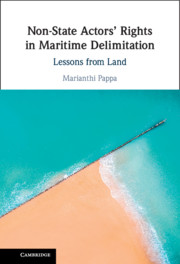Book contents
- Non-State Actors’ Rights in Maritime Delimitation
- Non-State Actors’ Rights in Maritime Delimitation
- Copyright page
- Dedication
- Contents
- Preface and Acknowledgements
- Table of Cases
- Table of Treaties and Conventions
- Other International Instruments
- Abbreviations
- 1 Prolegomena
- 2 Private Rights in Areas of Uncertain Jurisdiction
- 3 The Divergent Role of Private Rights in Land and Maritime Delimitation
- 4 The Uneven Preservation of Reallocated Private Rights on Land and at Sea
- 5 Reassessing the Asymmetry
- 6 Reaching an Equilibrium
- 7 Epilogue
- Bibliography
- Index
4 - The Uneven Preservation of Reallocated Private Rights on Land and at Sea
Published online by Cambridge University Press: 15 June 2021
- Non-State Actors’ Rights in Maritime Delimitation
- Non-State Actors’ Rights in Maritime Delimitation
- Copyright page
- Dedication
- Contents
- Preface and Acknowledgements
- Table of Cases
- Table of Treaties and Conventions
- Other International Instruments
- Abbreviations
- 1 Prolegomena
- 2 Private Rights in Areas of Uncertain Jurisdiction
- 3 The Divergent Role of Private Rights in Land and Maritime Delimitation
- 4 The Uneven Preservation of Reallocated Private Rights on Land and at Sea
- 5 Reassessing the Asymmetry
- 6 Reaching an Equilibrium
- 7 Epilogue
- Bibliography
- Index
Summary
This chapter investigates the way in which international law treats reallocated private rights post delimitation. In doing so, it examines the various mechanisms which are available in international law for the accommodation of such rights on land and at sea, respectively. Firstly, the study compares the conventional mechanisms which are employed by states. Next, it compares the mechanisms which are employed in delimitation case law. A synthesis of the findings reached shows that the accommodation of reallocated private rights is more systematic and effective on land than in the ocean. This demonstrates that reallocated private rights have a greater chance of surviving on land than at sea.
Keywords
- Type
- Chapter
- Information
- Non-State Actors' Rights in Maritime DelimitationLessons from Land, pp. 96 - 135Publisher: Cambridge University PressPrint publication year: 2021

